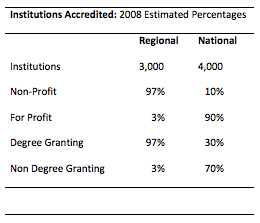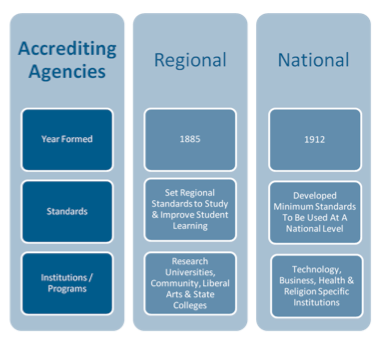Institutional Accreditation
Institutional accreditation evaluates an entire organization and requires that each part is contributing to the objective unifying the organization. Institutional accreditors assess an organization’s educational programs, administration, finances, technology, admissions and other services offered. These institutions may be degree or non-degree granting. They may also be for-profit or non-profit.
Regional and National Accreditors
 Institutional accreditation began in 1885 when the first accrediting agencies formed to study student success and standardize the qualifications of higher education. This was the beginning of accreditation standards that were monitored by regional accreditors. Regional accreditors developed geographically to support regionally located colleges. Being close to the schools allowed them to better anticipate the needs of the students and monitor the needs of an institution. At first, accreditation standards were developed according to region and varied depending on location.
Institutional accreditation began in 1885 when the first accrediting agencies formed to study student success and standardize the qualifications of higher education. This was the beginning of accreditation standards that were monitored by regional accreditors. Regional accreditors developed geographically to support regionally located colleges. Being close to the schools allowed them to better anticipate the needs of the students and monitor the needs of an institution. At first, accreditation standards were developed according to region and varied depending on location.
However, the development of regional accreditation standards instigated a rise in career specific schools that began developing their own accreditation standards that could be used at the national level. In 1912, a group of private professional schools developed one of the first national accrediting agencies. The National Association of Accredited Commercial Schools used minimum quality standards as required to meet the needs of career-based institutions throughout the United States.
Today, regional accreditors provide institutional accreditation to around 3,000 colleges and universities, providing more than 17 million students with degrees at associate, baccalaureate and doctoral levels. Regional agencies accredit a long list of institutions including research universities, community colleges, liberal arts colleges and state colleges. More than 96 percent of all regionally accredited institutions are non-profit degree granting institutions.
National accreditors provide institutional accreditation to around 4,000 religious and career oriented institutions. These are schools that offer a specialized curriculum, such as bookkeeping, accounting, mathematics, religion, general computer techniques, business, health, distance education or information technology. Most nationally accredited institutions are non-degree granting and for profit.

